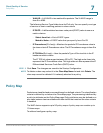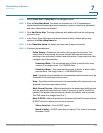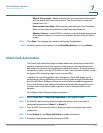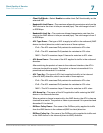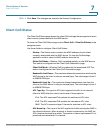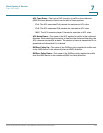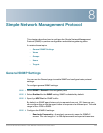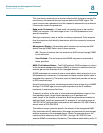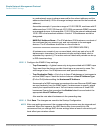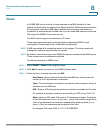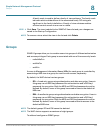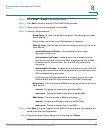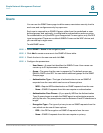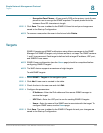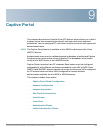
Simple Network Management Protocol
General SNMP Settings
Cisco Small Business WAP551 and WAP561 Wireless-N Access Point 131
8
in a subnetwork range is always reserved for the subnet address, and the
address identified by .255 in the range is always reserved for the broadcast
address.)
As another example, if you enter a range of 10.10.1.128/25, machines with IP
addresses from 10.10.1.129 through 10.10.1.254 can execute SNMP requests
on managed devices. In this example, 10.10.1.128 is the network address and
10.10.1.255 is the broadcast address. A total of 126 addresses would be
designated.
• NMS IPv6 Address/Name—The IPv6 address, DNS hostname, or subnet of
the machines that can execute, get, and set requests to the managed
devices. The IPv6 address should be in a form similar to
xxxx:xxxx:xxxx:xxxx:xxxx:xxxx:xxxx:xxxx (2001:DB8::CAD5:7D91).
A hostname can consist of one or more labels, which are sets of up to 63
alphanumeric characters. If a hostname includes multiple labels, each is
separated by a period (.). The entire series of labels and periods can be up
to 253 characters long.
STEP 5 Configure the SNMPv2 trap settings:
• Trap Community—A global community string associated with SNMP traps.
Traps sent from the device provide this string as a community name. The
valid range is from 1 to 60 alphanumeric and special characters.
• Trap Destination Table—A list of up to three IP addresses or hostnames to
receive SNMP traps. Check the box and choose a Host IP Address Type
(IPv4 or IPv6) before adding the Hostname/IP Address.
An example of a DNS hostname is snmptraps.foo.com. Because SNMP traps
are sent randomly from the SNMP agent, it makes sense to specify where
exactly the traps should be sent. You can have a maximum of three DNS
hostnames. Ensure that you select the Enabled check box and select the
appropriate Host IP Address Type.
Also see the note about hostnames in the preceding step.
STEP 6 Click Save. The changes are saved to the Startup Configuration.
NOTE After new settings are saved, the corresponding processes may be stopped and
restarted. When this happens, the WAP device may lose connectivity. We
recommend that you change WAP device settings when a loss of connectivity will
least affect your wireless clients.



